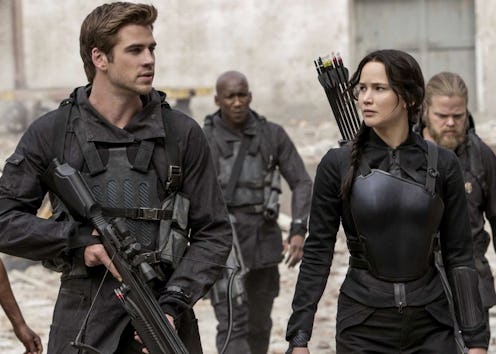Entertainment
One Way The "Hunger Games' Movies Beat the Books

When it was announced that Suzanne Collins' Hunger Games series would be adapted for blockbuster-big screens, it made a lot of sense: It was the logical next business step, a series that combined elements of the phenomena of both the Harry Potter and Twilight franchises. Three movies in, though, comparisons to Twilight ring utterly false. A big part of this shift? It would have been hard to predict just how much the Hunger Games movies would sideline the love triangle aspect of the story — and how thoroughly refreshing it would be when they did. And in the jump from books to screen, it's one way these adaptations are actually beating their source material.
Team Peeta and Team Gale are not quit dead, but it's clear in Mockingjay that they are never the point, at least not romantically. Gale still isn't particularly enamored with Peeta or his relationship with Katniss, but his feelings only rarely manifest as jealousy in Mockingjay — the movie more often compares Gale and Peeta's position within the revolution than they're position in Katniss' heart, as in one scene where Gale informs Katniss of just how much he looks down on Peeta speaking the words of the Capitol.
Katniss spends much of Mockingjay thoroughly wrapped up in Peeta — she is, after all, a person thoroughly and completely loyal to those she cares about and those she's pledged to take care of, and she sees Peeta's capturing by the Capitol as one of her most ultimate failings.
There are only two scenes in which the questions of Katniss' romantic allegiance fully manifests in Mockingjay. In one, Gale recalls his rescue of those he could help in District 12, and then brings up the time Katniss kissed him after his whipping. Katniss crosses the room and kisses him again. "I knew you'd do that," he says, commenting that she only kisses him when he's in pain. "Don't worry, Katniss, it'll pass." In another, Finnick tells Katniss that he knew during the Catching Fire scene where Peeta was electrocuted that Katniss truly loved Peeta. "I'm not saying in what way," he says, "I'm not even sure you know yourself."
And so it is that the two Mockingjay scenes that most fully evoke the series' love triangle also serve to assert that the romantic aspects of Katniss' life will very purposely be falling to the wayside. There are many reasons why by this point Katniss has not "made up her mind" and picked one of the two boys who in the past had vied for her heart — one of the biggest of those reasons is that she does love them both deeply, and that the romantic side of those relationships is far from the most crucial to consider. It doesn't matter who she'd choose to keep on kissing if living in a world where she had the privilege of having them both alive and healthy — to Katniss these boys are not chiefly romantic interests, they are chiefly her best friends, and two people with whom she has an intense bond that transcends the tropes of the YA genre.
In other words: Gale might still be angsting over Katniss' romantic feelings, but neither Katniss or director Francis Lawrence is. Katniss has other things to worry about, and Mockingjay makes it clear that romantic love is the last kind of love that Katniss is thinking about.
The books, for all their strengths, spend much more time contemplating Katniss' romantic choices — for one there are simply more scenes of Gale pressuring her to declare her feelings, or Peeta expressing insecurity over the deceptions of the first Games or her relationship with Gale.This is something that wasn't left unseen in Catching Fire's film, it should be noted: the film's first act, especially, spent its share of time in that realm.
But the movies have an advantage over the books: By the very nature of its form, the movies have to trim the fat. So yes, Catching Fire spent some time with the triangle; but it also cut out a lot of the aimless contemplating Katniss does after these boys make it perfectly clear they're not a fan of living in romantic limbo. In Mockingjay, the trimming of the fat's taken to the next level: As District 12 lays in ruins around them, it becomes perfectly clear that no one in this situation has any time to contemplate romantic interests. Catching Fire's first act took place in these people's daily lives; now there's no such thing as daily life, they're in a revolution. And so, unlike on the page, neither Katniss or the boys who love her spent much time thinking about their lives in terms of who this girl would choose.
As The Hunger Games series has moved forward toward its finale, the love triangle that could have easily dominated the movies based on Hollywood's past habits in its genre has instead been declared practically irrelevant. This isn't something that happened in the books, but it's something to be grateful for. The movies, after all, offer just as deep a portrait of the way one teenage girl loves — you just have to be willing to look outside of existing romantic tropes to see it.
Image: Lionsgate